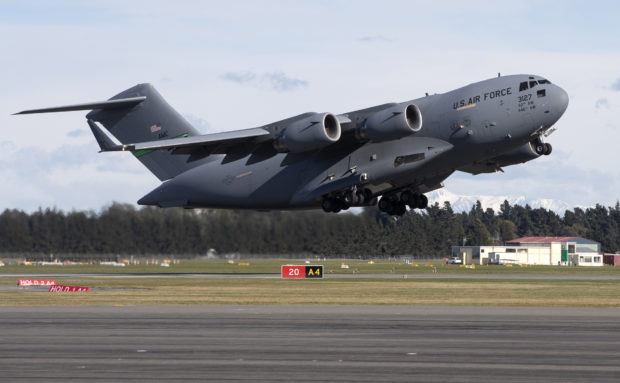First US spring flight to Antarctica aims to keep out virus

A U.S. Air Force C-17 takes off from Christchurch Airport in the season’s first flight to McMurdo Station in Antarctica, Monday, Sept. 14, 2020. The first U.S. flight into Antarctica following months of winter darkness left from New Zealand Monday with crews extra vigilant about keeping out the coronavirus. (AP Photo/Mark Baker)
WELLINGTON, New Zealand — The first U.S. flight into Antarctica following months of winter darkness left from New Zealand on Monday with crews taking extra precautions to keep out the coronavirus.
Antarctica is the only continent without the virus, and there is a global effort to make sure incoming scientists and workers don’t bring it with them.
The U.S. Air Force flight left from the gateway city of Christchurch carrying 106 passengers and crew, said Tony German, the U.S. Antarctic program’s representative in New Zealand.
He said the new arrivals will start getting ready for the summer and swap out with skeleton crews who have spent the Southern Hemisphere winter in Antarctica.
The flight was delayed for three weeks by big storms, resulting in an extended six-week quarantine for those aboard.
Article continues after this advertisementGerman said the crews were first isolated in San Francisco for four days and then spent another five weeks isolated in New Zealand, undergoing several virus tests along the way.
Article continues after this advertisementWhen they arrive at McMurdo Station, he said, the facility will be at Code Yellow, meaning everybody will wear masks for two weeks.
“We are being meticulous to ensure nothing happens,” German said.
If the virus was to break out at the station, he said, they have protocols in place to test and isolate anybody who is infected.
Still, the flight delays over recent weeks underscore how difficult it can be to quickly evacuate people from Antarctica who are suffering severe medical problems.
German said it took more than a week for winter crews at McMurdo, the main U.S. station on the continent, to dig out from the storms and clear the runway in order for the flight to proceed.
The Boeing C-17 Globemaster is due to arrive Monday afternoon, the first U.S. flight to the continent since early May.
Officials say there was unusual teamwork among the United States, China, Russia and other countries this year to ensure they keep the virus out. All are planning reduced numbers at their stations.
The number of people at McMurdo is set to peak at 450 this summer, about one-third of the usual number.
Some planned research and construction will be delayed. German said the main goals are to keep the facilities running and prepare for next year’s winter-over, while trying to do some science along the way.
“The show must go on,” he said.
gsg
For more news about the novel coronavirus click here.
What you need to know about Coronavirus.
For more information on COVID-19, call the DOH Hotline: (02) 86517800 local 1149/1150.
The Inquirer Foundation supports our healthcare frontliners and is still accepting cash donations to be deposited at Banco de Oro (BDO) current account #007960018860 or donate through PayMaya using this link.